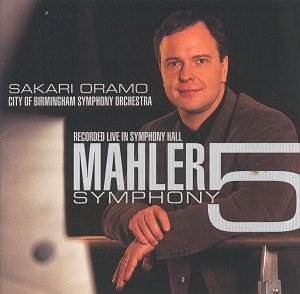Although the thought may appear a little
surprising, there can be little doubt
that Birmingham now has a significant
Mahler tradition. But its begetter has
moved on and, in any case, it doesn’t
really include the Fifth Symphony because
Sir Simon came to it, along with the
Eighth, only quite recently. His successor
Sakari Oramo has, by all accounts, proved
very worthy and here sets down what
seems to be his first Mahler recording
in performances drawn from two concerts
given about a year ago. It seems logical
to compare this performance with Rattle’s
2002 live recording from Berlin – taken
from his first concerts there as principal
conductor (see link to review below).
Of course there is a morasse of other
Mahler Fifths out there and I will also
make some comparisons with Walter (1947),
Barbirolli (1969), Karajan (1973) and
Haitink (live in 1986).
Both Oramo and Rattle
are unremarkable throughout in terms
of tempi and they don’t come close to
the concision of Walter or longueurs
of Barbirolli. Oramo’s approach is long
on structure and sensitivity but not,
perhaps, particularly distinctive. He
is certainly less interventionist than
Rattle. Neither quite captures the various
moods of this piece as fully as Walter
does – his opener is the most funereal,
the second movement has the most vehemence
and his is the most flowing but still
rapt adagietto. But, coming back to
the Oramo/Rattle comparison, there was
a greater sense of occasion in Berlin
(as there should have been!) and Rattle’s
version stands out more.
The playing of the
excellent City of Birmingham Symphony
Orchestra is idiomatic and they are
given very good recorded sound. This
was a performance that one would certainly
have been pleased to catch in the concert
hall. There is little or no audience
noise until the well-deserved applause
at the end.
In negotiating the
maze of Mahler Fifths, it would make
sense to acquire at least one studio
and one live version. Walter’s version
with the New York Philharmonic comes
from the studio and is indispensable
despite the historic mono sound (see
links to reviews of a recent reissue).
For me, he gets much closer to the heart
of this piece than the idiosyncratic
Barbirolli or slightly clinical Karajan,
both of whom go well over the 70 minute
mark; Walter takes just 61 minutes but
doesn’t sound rushed. Haitink also cleared
the 70 minute barrier in his live Christmas
day concert from the Concertgebouw but
this is another a live performance to
be reckoned with - no patching here
– a real one-off. My marginal preference
for a live version would be for Rattle
but, as Tony Duggan’s review shows,
he may not suit all tastes. Indeed Oramo
could be a safer choice. I have little
doubt that City of Birmingham fans will
love this disc and anyone looking for
a decent middle-of-the-road version
of this work in fine sound is unlikely
to be disappointed.
Patrick C Waller
Link to review of Rattle’s Mahler 5:
http://www.musicweb-international.com/classrev/2002/Nov02/Mahler5_Rattle.htm
Link to reviews of Walter’s Mahler 5:
http://www.musicweb-international.com/classrev/2005/Mar05/Mahler5_Walter_8110896.htm
http://www.musicweb-international.com/classrev/2005/Apr05/mahler5_walter_8110896.htm


